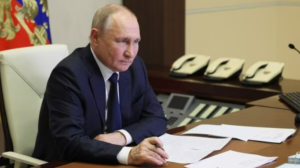Amidst the tense backdrop of escalating conflict in Ukraine, Prime Minister Narendra Modi’s strategic outreach to Russian President Vladimir Putin emerged as a pivotal factor in preventing a potential nuclear catastrophe, according to a recent CNN report.

The report highlighted the collaborative efforts of global leaders, including diplomatic interventions from various countries, which played a crucial role in deterring Russia from considering a “potential nuclear attack” on Ukraine.
As detailed in the report, the United States had been actively preparing for the possibility of a nuclear strike by Russia as Ukrainian forces gained momentum on the battlefield, causing setbacks for Putin’s army. However, it was the collective influence of leaders like PM Modi and Chinese President Xi Jinping that potentially dissuaded Putin from pursuing such a drastic course of action in 2022.
US officials cited in the report emphasized the significance of outreach and public statements from leaders like Modi and Xi Jinping, which contributed to averting an impending crisis. This coordinated effort came at a critical juncture when Russian forces faced the risk of being encircled as Ukrainian troops advanced towards Kherson.
Furthermore, amid allegations from Moscow about the potential use of a “dirty bomb” by Ukraine, concerns within the US administration escalated, speculating that a significant loss at Kherson could trigger Russia to deploy nuclear weapons under the guise of retaliation.
To counter this escalating threat, the US sought support from non-allied nations, including India, to dissuade Russia from resorting to extreme measures. A senior US administration official highlighted the collaborative approach taken, stating, “One of the things we did was not only message them directly but strongly urge, press, encourage other countries, to whom they might be more attentive, to do the same thing.”
The involvement of countries like India, alongside China and others, in condemning civilian casualties and advocating for a peaceful resolution to the Russia-Ukraine conflict underscored the collective global effort in preventing a potential nuclear crisis.